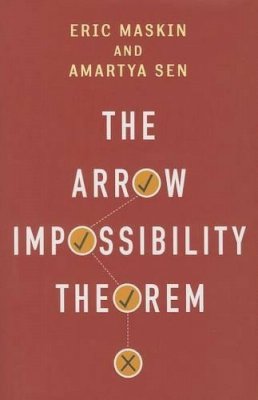6%OFF

Stock image for illustration purposes only - book cover, edition or condition may vary.
The Arrow Impossibility Theorem
Eric Maskin
€ 19.99
€ 18.72
FREE Delivery in Ireland
Description for The Arrow Impossibility Theorem
Hardback. Series: Kenneth J. Arrow Lectures Series. Num Pages: 168 pages. BIC Classification: KCA. Category: (P) Professional & Vocational. Dimension: 149 x 211 x 17. Weight in Grams: 328.
Kenneth J. Arrow's pathbreaking "impossibility theorem" was a watershed innovation in the history of welfare economics, voting theory, and collective choice, demonstrating that there is no voting rule that satisfies the four desirable axioms of decisiveness, consensus, nondictatorship, and independence. In this book Eric Maskin and Amartya Sen explore the implications of Arrow's theorem. Sen considers its ongoing utility, exploring the theorem's value and limitations in relation to recent research on social reasoning, and Maskin discusses how to design a voting rule that gets us closer to the ideal-given the impossibility of achieving the ideal. The volume also contains a contextual introduction by social choice scholar Prasanta K. Pattanaik and commentaries from Joseph E. Stiglitz and Kenneth J. Arrow himself, as well as essays by Maskin, Dasgupta, and Sen outlining the mathematical proof and framework behind their assertions.
Product Details
Format
Hardback
Publication date
2014
Publisher
Columbia University Press
Condition
New
Series
Kenneth J. Arrow Lectures Series
Number of Pages
168
Place of Publication
New York, United States
ISBN
9780231153287
SKU
V9780231153287
Shipping Time
Usually ships in 15 to 20 working days
Ref
99-15
About Eric Maskin
Eric Maskin is the Adams University Professor at Harvard University. He received the 2007 Nobel Memorial Prize in Economics (with L. Hurwicz and R. Myerson) for laying the foundations of mechanism design theory. He has also contributed to game theory, contract theory, social choice theory, political economy, and other areas of economics. Amartya Sen is the Thomas W. Lamont University Professor and Professor of Economics and Philosophy at Harvard University. In 1998 he was awarded the Nobel Memorial Prize in Economic Sciences, and in 1999 he was awarded the Bharat Ratna, India's highest civilian award. He is also a senior fellow at the Harvard Society of Fellows; distinguished fellow of All Souls College, Oxford; and a Fellow of Trinity College, Cambridge. His books have been translated into more than thirty languages.
Reviews for The Arrow Impossibility Theorem
Without hyperbole, no postwar intellectual of the first rank has done more good for more people-above all, many of the world's poorest-than Amartya Sen.
Boyd Tonkin The Independent What is Arrow's impossibility theorem? Why is it true? What are its implications for democratic decision making? Is its nihilism justified? These are the kinds of questions addressed in Maskin and Sen's masterful Arrow lectures. These lectures and the accompanying essays provide an accessible introduction to Kenneth J. Arrow's theorem for the neophyte and much food for thought for the cognoscente.
John A. Weymark, Vanderbilt University How vital it is to understand the ideas behind Kenneth J. Arrow's impossibility theorem if we want to design reasonably fair ways of coming to consensus decisions that take equitable account of individual preferences. This book is a marvelous introduction to the theorem, a keystone in the theory of social choice. We are treated to a discussion of that theory-its origin, background, and the challenges it points to-by some of its great architects.
Barry Mazur, Harvard University, author of Imagining Numbers The pioneers of social choice theory give us lively, enjoyable, and stimulating lectures and exchanges of ideas. Their views, more than sixty years after the publication of Kenneth J. Arrow's theorem, are of paramount interest to anyone aware of the difficulties of collective decisions.
Marc Fleurbaey, Princeton University
Boyd Tonkin The Independent What is Arrow's impossibility theorem? Why is it true? What are its implications for democratic decision making? Is its nihilism justified? These are the kinds of questions addressed in Maskin and Sen's masterful Arrow lectures. These lectures and the accompanying essays provide an accessible introduction to Kenneth J. Arrow's theorem for the neophyte and much food for thought for the cognoscente.
John A. Weymark, Vanderbilt University How vital it is to understand the ideas behind Kenneth J. Arrow's impossibility theorem if we want to design reasonably fair ways of coming to consensus decisions that take equitable account of individual preferences. This book is a marvelous introduction to the theorem, a keystone in the theory of social choice. We are treated to a discussion of that theory-its origin, background, and the challenges it points to-by some of its great architects.
Barry Mazur, Harvard University, author of Imagining Numbers The pioneers of social choice theory give us lively, enjoyable, and stimulating lectures and exchanges of ideas. Their views, more than sixty years after the publication of Kenneth J. Arrow's theorem, are of paramount interest to anyone aware of the difficulties of collective decisions.
Marc Fleurbaey, Princeton University
